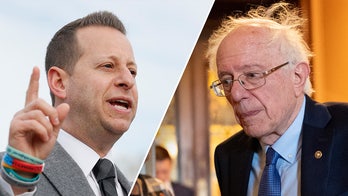"Next time you hear some politician with a three-point plan on $2 gas, you let them know -- tell them we're tired of hearing election-year promises. What we need is a serious all-of-the-above strategy for American efficiency innovation."
-- President Obama campaigning in Mt. Holly, N.C. on Wednesday.
"We've heard promises about energy independence from every president, Democratic and Republican, since Richard Nixon. Yet the only thing that is different now is that we're even more dependent on foreign oil, our planet is in even greater peril and the price of gas keeps going up and up and up."
-- Then-Sen. Barack Obama campaigning in Indianapolis on April 25, 2008.
There are lots of reasons Congress is having trouble passing an extension of the federal transportation package set to expire at the end of the month.
Conservatives complain about phony accounting in the existing system. Liberals complain that Republican-backed proposals are too stingy with money for construction projects.
But the biggest sticking point in the legislation is where the base funding comes from: an 18.3-cent tax paid by consumers on each gallon of gasoline sold in the United States. It might be impractical to end that tax three weeks from now, but, like the debt ceiling, nobody wants to be the one who has to vote for it.
In order to keep that tax at the same rate for the last 20 years while simultaneously meeting the always-growing demand for new roads, bike paths, municipal parking garages and everything else that federal highway funds are used for, Congress has found increasingly, um, innovative ways to deal with road funding.
The preferred method was to allocate just enough money to get a project too far along to stop working on and then essentially borrow from general revenues against expected future gas tax revenues to complete the project. The highway trust fund borrows money from the Treasury, which borrows money from the Social Security trust fund, which is being intentionally under-funded to finance a payroll tax holiday... What could go wrong?
The new Republican majority in the House has sought reforms, but has ended up unable to move what is the most politically important piece of legislation for every Congress: returning some of voters' tax money to them in the form of road projects.
Any lawmaker can tell you that there's nothing like the smell of hot asphalt spread in the summer of an election year. The $30 billion or so each year that comes in from fuel taxes is one of the favorite ways to parcel pork. But the Republican reforms mean that there aren't any earmarks to buy votes for the larger bill. And the fiscal hard-liners aren't satisfied either because they still hate the model, which essentially involves having the feds tax every driver, collect the money, skim off their cut, and distribute the funds back to the states.
But with the deadline nearing, the Senate is getting ready to move forward a transportation bill and work continues in the House. Gone are ideas of big changes and long-range reforms. The current goal is just to continue to fund the status quo and maintain current gas taxes until after the election for what is shaping up to be the mother of all lame duck sessions.
Between a divided Congress (both House versus Senate and within the Republican side of the House itself) and a politically vulnerable president already in a re-election frenzy, Washington may never have kicked so many cans in a single election year as it.
Further complicating the situation is the fact that the extension of the gasoline tax is being debated at a moment when gasoline prices are sky high and still climbing.
President Obama is hoping that Israel will hold off striking Iran's nuclear program, a move that could cause a huge spike in gas prices, adding yet another threat to the weak recovery and his own political prospects. But the situation in the Middle East as well as increasing demand from new drivers in the developing world means that even if Obama can keep Israel at bay, gas prices will be uncomfortably high for most of the year.
The Obama Democrats had toyed with the idea of refusing to help Speaker John Boehner pass a transportation bill extension, reviving again the narrative of a do-nothing Congress held hostage by Tea Party Republicans. It is the preferred Democratic talking point of 2012, but the transportation bill is too risky for that gamble.
Not only do Democrats want to get the money spent, they are not keen to have an in-depth conversation about federal gas taxes right now. Obama prefers to focus on the tax breaks he wants to end for energy companies to fund environmentally conscious alternative energy sources, not the taxes all American drivers are already paying.
Knowing that gas prices are heading higher and knowing how well he exploited the issue of high gas prices himself as an outsider candidate in 2008, the president is on a urgent mission to insulate himself from energy-price energy. In a relentless swing-state campaign push, Obama is denouncing what he says are Republican efforts to prevent him from taking the needed funds away from oil companies to reduce gasoline prices.
Obama wants you to know -- especially if you live in North Carolina, Virginia, New Hampshire or Florida -- that high gas prices are 1) not his fault and 2) Republicans are to blame.
It's the gas price version of his larger campaign pitch: Republicans are protecting the rich from paying their "fair share" and keeping middle class voters from the benefits of that money.
Whatever the issue, the president always seems to find a way to talk about class inequality.
This may be the most complicated re-election strategy ever by an incumbent. But Team Obama is very clearly in love with the idea of having a central theme that animates each facet of the campaign and informs every issue. It is self-flattering - the kind of high-minded jabberwocky that wins approving nods from the political press corps for "strategic thinking, not tactical behavior." It is also a way to take a liberal idea and make it part of the mainstream discussion. Class conflict is also designed to hobble rich dude Mitt Romney, who keeps inching closer to the Republican nomination.
But pulling every issue through the knothole of class equity tends to distort things. The president keeps talking about gasoline prices, but not how they will soon be lower. Instead, he mostly talks about why they are so high and why Republicans and rich dudes are to blame.
Yes, he talks about how, in a misty place in the not-so-distant future the problem will be solved once and for all - algae and Chevy Volts and other exotic, impractical-sounding ideas -- but that kind of puffery reinforces the negative view of Obama as all talk and no action. Remember how George W. Bush got mocked for talking about switchgrass?
Obama will eventually decide to tap the Strategic Petroleum Reserve, but he will want to wait until the temporary drop in prices is more politically beneficial. Until that moment, presumably sometime this summer, Obama will keep talking about rich dudes and alternative fuels on the campaign trail and, in a delicious political irony, repeating John McCain's 2008 energy slogan "all of the above."
But no matter how strategic Obama's thinking, if gas is nearing $5 this summer, the economy will likely be in a stall, voters will be angry and the president will be holding the bag.
The Obama campaign can see all that ahead, but, tied down to their ideological and strategically rigid campaign plan, they don't seem to be able to find a way to avoid it.
Chris Stirewalt is digital politics editor for Fox News, and his POWER PLAY column appears Monday-Friday on FoxNews.com.




